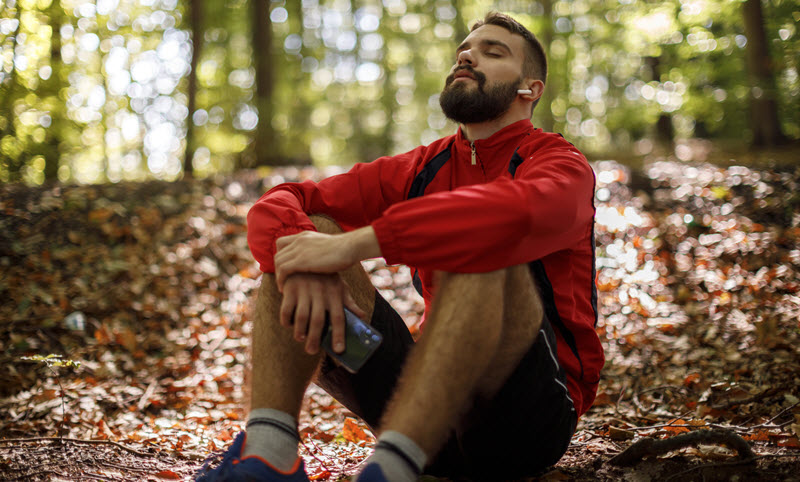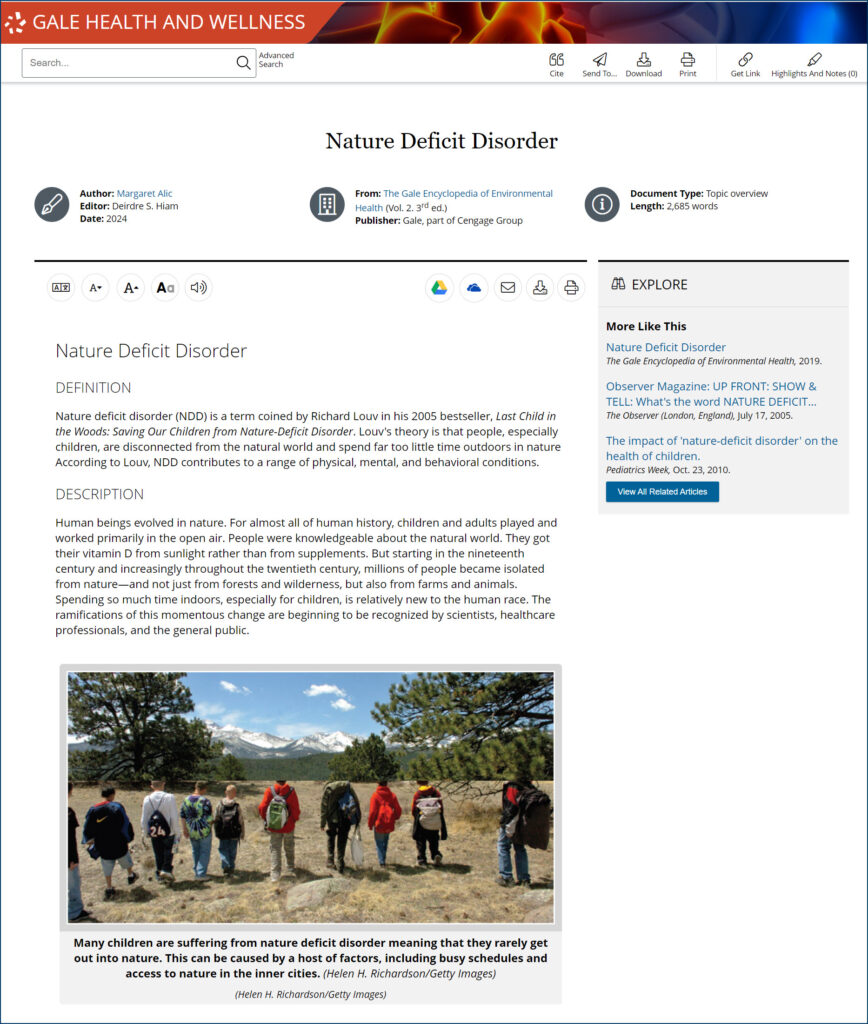| By Gale Staff |
Millions of Americans struggle with their mental health, though many forgo treatment due to cost, stigma, and accessibility issues. For this reason, free community wellness resources—such as those often available through a public library—play a critical role in mental health information and outreach. Readily available information and low-cost or free activities can empower people to gain some control over their mental health.
One of the simplest ways to immediately improve your mental health is to get outside. Mother Nature provides an easy approach, and there are real science-backed connections between spending time outdoors and improved mental health. The National Recreation and Park Association recommends as little as 20 minutes outside to help reduce stress.
June is officially designated as Great Outdoors Month. It’s a chance to encourage people to get outside after the long winter months and indulge in the feel-good benefits of sunshine and fresh air. This summer, inspire your community to explore the great outdoors!
Your library’s Gale Health and Wellness subscription is a valuable resource for this endeavor. This curated database offers a wealth of information about the profound link between nature and mental health. Additionally, you can leverage this knowledge to host events, plan activities, and develop outreach materials, providing your patrons with the support they need.
Explore the Link Between People and Nature
As a species, we are deeply connected to the natural environment. For thousands of years, we have relied on the sun and stars for navigation, trees for shelter, and the earth for food. The seasons and weather determined our diets—and still do today, albeit to a lesser extent. But we’ve undergone major changes in recent centuries, with more than half of the human population living in dense, urban areas.
We’ve become acclimated to a more sedentary, indoor lifestyle. Today, the average American spends just 7% of their time outside, which has even led to new conditions such as Nature Deficient Disorder. Advocates of Great Outdoors Month and medical experts have connected the dots and recognized nature-based remedies for stress and anxiety. Nonprofit Park Rx even encourages healthcare professionals to integrate the great outdoors into their treatment plans.
Share Real Scientific Evidence
For those who want the hard facts, Gale Health and Wellness has curated research to support spending more time outside. A 2024 study suggests that senior citizens living close to nature had a more positive outlook on their overall health. Finnish researchers found that the more time individuals suffering from hypertension spend outside, the less medication they require for their condition. The University of Essex found that even five minutes outside could help boost self-esteem. There is plenty of evidence to support the vital connections between wellness and our natural environment.
Facilitate Nature-Based Activities Through the Library
This June, encourage your community to build healthy outdoor habits into their daily routines. If air quality is an issue in your region, consider offering tips on how to mitigate the risks—especially for more vulnerable groups.
Plan a Wellness Walk
Invite your patrons on a group wellness walk. This could be a guided hike in a nearby state park or a simple stroll around town. Ask a local park ranger to join and describe the native plants and animals you see. Encourage attendees to compare how they feel before and after the walk. You can host it weekly throughout the summer and work toward a community 5K walk. Have participants reflect on their wellbeing after this extended period of continued outdoor exercise—can they feel a difference before and after summer? Are they motivated to continue?
Organize an Outdoor Volunteer Event
People deserve access to clean green spaces, but keeping community playgrounds and parks litter-free requires a big effort. Organize a nature-based service day with your local park service, church, or other community group. Provide volunteers with gloves, trash bags, and other cleaning supplies, and dedicate your combined effort to cleaning up a local green space. You could also partner with the park service or a local greenhouse to plant native trees or other flora.
Host a Photo Competition
Integrate your summer reading program with Great Outdoors Month. Throughout June, encourage patrons to take photos of themselves reading a great summertime title while spending time outside. Use social media or a library display to share these fun photos. If funding allows, raffle off prizes for the most exotic or silliest entries; people could even vote on social media. Themed prizes could include outdoor necessities like beach towels, sunglasses, or a library-branded thermos.
Encourage Family-Focused Time in Nature
Have Lunch in the Park
While summer vacations to state or national parks sound dreamy, these adventures are out of reach for many due to finances, accessibility, or time constraints. Instead, encourage community members to find small, meaningful ways to spend time outside daily. Host a picnic in a nearby park to show how simple (and fun) it can be!
Reduce Screen Time
Screen time poses a significant mental health challenge, especially for younger Americans. Experts suggest that children and teens should spend at most two hours each day in front of screens, but the Centers for Disease Control estimates that American teens average closer to eight hours. Share the facts, and encourage families to plan screen-free days and unplug with outdoor hobbies such as putt-putt golf, short hikes, or playing a board game outside.
Center Accessibility So Everyone Can Take Part
Gale Health and Wellness makes mental health information understandable and accessible. Patrons can download articles to their personal devices for reference at any time. Plus, Gale resources feature customization tools to accommodate all users, including ESL learners and those with visual or reading disabilities.
As you develop content for your library users, consider barriers such as cost and accessibility. Able-bodied people and those with reliable transportation can more easily access natural spaces, but everyone deserves the benefits of the great outdoors.
- Emphasize the 20-minute goal. Busy adults or those with mobility limitations may find it challenging to get outside each day. Remind people that just 20 minutes spent in nature can lower stress levels.
- Create a map of accessible outdoor spaces within walking distance of your library.
- Promote bus routes or encourage carpooling for offsite nature walks or related activities.
- Share affordable nature-based programs, such as the National Parks Service senior pass, and information about your state’s parks and recreation resources.
This June, and all year round, help your patrons fall in love with the great outdoors. Ensure they know the valuable resources available through your library, especially Gale Health and Wellness. This comprehensive portal provides reliable information related to mental health and can help destigmatize this challenging topic.
If your library isn’t a current Gale subscriber, contact a local representative to learn more about our user-friendly databases.


